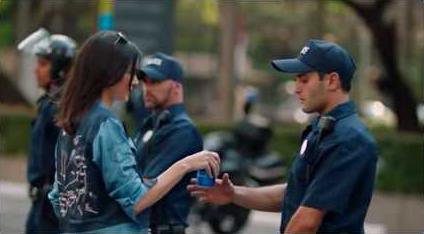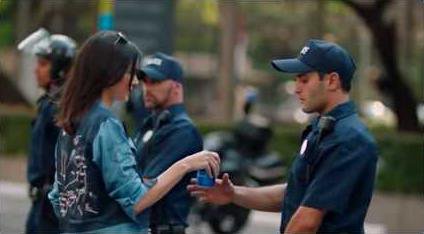Kendall Jenner and Pepsi received heavy criticism this week for a new ad that lasted only a day.
On Tuesday, Jenner tweeted out Pepsis new ad (it's since been deleted), which shows the celebrity leaving a photoshoot to join a group of protesters who are calling for peace.
The ad promptly received a heavy amount of backlash from Americans because "it trivialized the widespread protests against the killings of black people by the police," according to The New York Times.
Pepsi pulled the controversial ad Wednesday, according to The Wall Street Journals Jennifer Maloney.
"Pepsi was trying to project a global message of unity, peace and understanding," the statement read, according to Maloney. "Clearly we missed the mark, and we apologize. We did not intend to make light of any serious issue. We are removing the content and halting any further rollout. We also apologize for putting Kendall Jenner in this position."
The ad originally sparked outrage on Tuesday. It shows Jenner hand a police officer a can of Pepsi, like a peace offering. The cop accepts the can, smiles and the crowd erupts in applause.
Critics said the ad showed protests that were a lot like those aimed at police brutality, BBC reported.
Bernice King, daughter of Dr. Martin Luther King Jr., spoke out against the ad in a tweet saying, "If only daddy would have known about the power of #Pepsi."
Other critics called the ad privileged, white and insensitive toward protesters, BBC reported.
Pepsi initially released a statement on Tuesday saying that the ad spread an important message.
"This is a global ad that reflects people from different walks of life coming together in a spirit of harmony, the statement said, according to BBC. We think that's an important message to convey."
Jenner has yet to comment on the ad.
On Tuesday, Jenner tweeted out Pepsis new ad (it's since been deleted), which shows the celebrity leaving a photoshoot to join a group of protesters who are calling for peace.
The ad promptly received a heavy amount of backlash from Americans because "it trivialized the widespread protests against the killings of black people by the police," according to The New York Times.
Pepsi pulled the controversial ad Wednesday, according to The Wall Street Journals Jennifer Maloney.
"Pepsi was trying to project a global message of unity, peace and understanding," the statement read, according to Maloney. "Clearly we missed the mark, and we apologize. We did not intend to make light of any serious issue. We are removing the content and halting any further rollout. We also apologize for putting Kendall Jenner in this position."
The ad originally sparked outrage on Tuesday. It shows Jenner hand a police officer a can of Pepsi, like a peace offering. The cop accepts the can, smiles and the crowd erupts in applause.
Critics said the ad showed protests that were a lot like those aimed at police brutality, BBC reported.
Bernice King, daughter of Dr. Martin Luther King Jr., spoke out against the ad in a tweet saying, "If only daddy would have known about the power of #Pepsi."
Other critics called the ad privileged, white and insensitive toward protesters, BBC reported.
Pepsi initially released a statement on Tuesday saying that the ad spread an important message.
"This is a global ad that reflects people from different walks of life coming together in a spirit of harmony, the statement said, according to BBC. We think that's an important message to convey."
Jenner has yet to comment on the ad.








